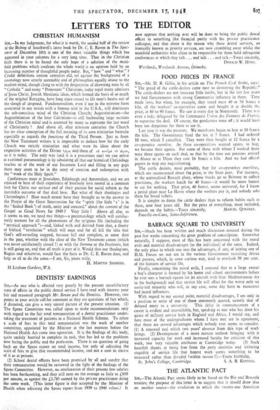LETTERS TO THE EDITOR
CHRISTIAN HUMANISM
Sin,—In my judgement, for what it is worth, the second half of the review of the Bishop of Southwell's latest book by Dr. C. E. Raven in The Spec- tator of December 10th is one of the most valuable things which has appeared in your columns for a very long time. That in the Christian faith there is to be found the only hope of a solution of the mani- fold problems which confront the whole world is an opinion held by an Increasing number of thoughtful people today. But, " how " and " what " ? Credal definitions sixteen centuries old, set against the background of a cosmology now utterly untenable and of philosophies equally otiose to the modern mind, though clung to with the desperation of drowning men by all "Catholic" and many " Protestant " Christians, today repel many admirers of Jesus Christ, Jewish Mesiianic ideas, which formed the basis of so much of the original Kerygma, have long since ceased to lift men's hearts out of the slough of despond. Fundamentalism, even if not in the extreme form associated in our minds with a famous trial in the U.S.A., still dominates the sub-conscious mind of the Christian Church; Augustinianism—the Augustinianism of the later Calvinism—is still beclouding large sections of the Christian mind and is assumed by many to represent the last word of Christianity I And above all, after nineteen centuries the Church has no clear conception of the full meaning of its own trinitarian formulm especially as regards the functions of the Third Person. Just as from the New Testament writers it is impossible to deduce how far the early Church was strictly trinitarian and what were its ideas about the respective activities of the Divine Xbyor and those of rb Tpei7I25 rhC6,101,, so it is today. The only way (and it is a precarious one) we can arrive at a rational pneumatology is by tabulating all that our historical Christology teaches us of the work of our Incarnate Lord and filling in any gaps there may seem to be in the story of creation and redemption with the "work of the Holy Spirit." Conferences meet at Jerusalem, Edinburgh and Amsterdam, and we are rejoiced to hear of their experience of brotherly love rooted in a common love for Christ our saviour and of their passion for social reform as the inevitable•outcome of that dual love. But what of their theologies and Christologies ? How much nearer have they brought us to the answer to the Prayer of the Great Intercession for the "spirit (the little ' s ' is in the 'Sealed Book ') of truth, unity and concord," about the content of the Gospel as Good News for 1949? Very little I Above all else, as it seems to me, we need two things—a pneumatology which will satisfac- torily account for all the phenomena of the religious life (including the "mystical approach ")—and, linked with and derived from that, a theory of biblical "revelation" which will once and for all kill the idea that God's self-revealing stopped, because full and complete, at some date in the past, whether with the close of the New Testament canon (which was never satisfactorily closed !) or with the Summa or the Institutes, but Is still going on, and that all truth is part of it. Would that our theologians, Regius and otherwise, would face the facts as Dr. C. E. Raven does, and help us all to do the same.—I am, Sir, yours truly,


































 Previous page
Previous page